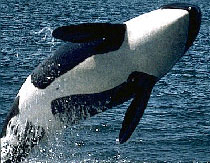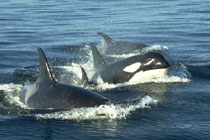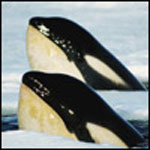| (insert your NIE or newspaper logo here) |
Weekly Online LessonOnline Lesson ArchiveGrade Level: 5-9
|
The Sights and Sounds of Orcas
 Orcas,
also known as "killer whales," have fascinated human beings
for centuries. In fact, many people who live close to the feeding grounds
and migration routes of orcas often feel a natural curiosity and closeness
to these highly visible and vocal neighbors.
Orcas,
also known as "killer whales," have fascinated human beings
for centuries. In fact, many people who live close to the feeding grounds
and migration routes of orcas often feel a natural curiosity and closeness
to these highly visible and vocal neighbors.
This certainly could be said of the situation in Puget Sound, Washington, where such feelings have prompted legal action to protect these marine mammals. Puget Sound's orca population has declined rapidly over the past few years, raising concerns about the effects of pollution, decline in food supplies, and close contact with boats.
Last year, several environmental organizations sued the National Marine Fisheries Service, after the agency acknowledged that the local orca population was at risk of extinction but failed to list them as an endangered species. On Monday, November 17, 2003, the acting district judge stated that he would return with his decision on the case within a month, but that the NMFS decision seemed to be based on scientific evidence which followed the law.
Orcas range widely across the oceans, and all of the world's localized populations were classified as one single species in the 1700s. However, the case's plaintiffs contend that the science the NMFS based its decision upon is outdated, and that the Puget Sound area's "resident" and "transient" killer whales should be classified separately. That would qualify Puget Sound's 83 residents as officially endangered, which would boost protection efforts.
So what's so special about orcas? You'll travel to the Pacific Northwest this week to find out!
Orca Basics
 Start
your trip at the British
Columbia Wild Killer Whale Adoption Program and Enter
the site.
Start
your trip at the British
Columbia Wild Killer Whale Adoption Program and Enter
the site.
Check out the Biology & Research section, starting with Killer Facts. What ocean animals are orcas' closest kin? In what ways do "resident" and "transient" orcas differ? What are "offshore" killer whales?
Next, take a look at this mammal's world Distribution. Where are orcas most concentrated? What do you think they find in those areas that draws them there?
As you read about orca Clans & Pods, you'll understand how their social organization relates to their family ties. What is the difference between a Community, a Clan, a Pod, and a Matriline? How does social organization seem to help the species avoid inbreeding?
 Read
and listen to Whale
Chat, and you'll discover how scientists analyze their
vocalizations.
Read
and listen to Whale
Chat, and you'll discover how scientists analyze their
vocalizations.
What is a dialect? What does echolocation sound like compared to the calls and whistles? How do scientists use these sound recordings as clues for figuring kinship?
Scientists also use Photo I.D. to identify group types of individual orcas. What two areas of the body do scientists rely on the most and why?
Make sure to review the Conservation issues to uncover how human activities affect orcas. How could these conditions be changed or avoided?
Before leaving, learn more KillerWhale Jargon, if you have time. How does countershading help camouflage them? What are lobtailing and pec-slapping?
Life with the Pod
 Now
that you've gotten the basics, let's go travel with the Vancouver Island
Orcas at Orca
Live. Get familiar with these pods starting with Highlights
2002. Watch both episodes to see how the orcas move and
hear how they communicate. To watch more orca clips, browse the
Highlights 2000 page.
Now
that you've gotten the basics, let's go travel with the Vancouver Island
Orcas at Orca
Live. Get familiar with these pods starting with Highlights
2002. Watch both episodes to see how the orcas move and
hear how they communicate. To watch more orca clips, browse the
Highlights 2000 page.
Next, Visit Hanson Island (Flash version also available from home page). Here, you'll learn more about this region of the Pacific Ocean and get a more in-depth look into orca behavior and ecology.
Using the right-hand navigation bar, begin with Where do orcas live? Then, you can either click on each section title in the navigation bar or on the forward arrow in the pop-up window.
As you browse through the pages (up to Behavior 3), think about how the behaviors of the orcas (feeding, rubbing, communicating, etc.) relate to the characteristics of the place. How do the features of the ocean's water, for example, influence food supplies? In what ways do killer whales seem well-adapted to these conditions? What happens when natural disasters or human activities significantly alter these conditions?
Newspaper Activities
In issues of Targetnewspaper look for stories about orcas or related marine mammals. Is the news about the pending lawsuit? Or does it feature environmental concerns, protection efforts, or new scientific findings? How does the news relate to or build upon what you know about killer whale behavior and biology? How does the news relate to people's feelings about orcas or other marine mammals?
© Copyright 2003
Learners Online, Inc.
